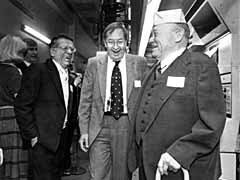Fred W. Smith



INCLINE VILLAGE — As a 27-year-old newspaper advertising executive in Fort Smith, Ark., Fred W. Smith was not sure what to do when he received a call asking him to become general manager of the Review-Journal.
Las Vegas in that year of 1961 was not the most glittering place in the world. It was Sin City in the eyes of many people from America’s Bible Belt.
What Smith really wanted was the managership of the much bigger Southwest Times-Record in his hometown of Fort Smith. And he was thinking about tying the knot with a local girl. They’d even bought a lot for home.
Las Vegas was a longshot, but Smith took the gamble.
“It certainly was different than Arkansas,” says Smith about his journey into the netherworld of Las Vegas. “I don’t know if I looked at it as Sin City. But I knew if I didn’t take the job, then I wouldn’t get another opportunity.”
Now 65, Smith figures he made the right decision. Largely because of Smith’s business acumen, the Donrey Media Group became a billion-dollar enterprise with 52 daily newspapers and five cable companies at its peak in the late 1980s, along with television and radio stations and outdoor advertising companies.
After his arrival in Las Vegas, Smith did not remain general manager for long. By 1966, he was vice president of Donrey’s western operations. Then in 1973, he became executive vice president and chief operating officer. In 1987 he was appointed president of the company and then in 1990 he became chairman.
The Review-Journal remains the largest newspaper in that chain. Smith’s work made his boss, Donald W. Reynolds, the richest man in Nevada before his death in 1993.
And to the day Reynolds died, Smith called him “Mister,” rather than by his first name.
“It was all I ever called him,” Smith said. “It wasn’t anything he demanded. It was just a respect thing. Don Reynolds was an awesome person. He came up from nothing. He had built a very strong base and because of timing I happened to be there when the growth took place.”
That Reynolds found a Nevada niche also was a matter of luck. Oklahoma-reared, Reynolds owned a couple of newspapers in his home state and Arkansas when he made a trip to Pasadena, Calif., and the Rose Bowl game on New Year’s Day 1949.
While on his football excursion, he intended to look for a paper or two in California. Reynolds secured a complimentary ticket to the game from The Associated Press and happened to take a seat next to Al Cahlan, editor of the Review-Journal. Cahlan also was an AP guest at the game.
“They got to talking,” Smith said. “Al Cahlan said, ‘Have you considered Nevada?'”
Within a few months, Reynolds bought controlling interest in the Review-Journal, circulation 7,000, from the Frank Garside family. He bought out the remaining partner, Cahlan, in 1960.
That was the start of Reynolds’ Silver State empire that eventually consisted of four newspapers, two television stations, two outdoor advertising companies and several radio stations.
Today Smith and wife, Mary, look out at the smoky skies over Lake Tahoe from their summer home along Incline Village’s exclusive Lakeshore Boulevard. A series of late summer wildland fires across the West have turned the normal crystal clear skies into a color that looks like Los Angeles smog.
But there is a putting green in the yard for Smith to tinker at golf and a boat down at the dock.
Their primary home remains in Las Vegas, where two of their three children live. The other child is their Incline Village neighbor. Fort Smith is a place they sometimes visit.
He retired from Donrey completely three years ago. Arkansas businessman Jackson Stephens, a Smith friend, bought Donrey after Reynolds’ death.
And $804 million of the purchase price went into the Donald W. Reynolds Foundation. The foundation is fully separate and not in any part related to the Donrey Media Group and the Review-Journal. Smith chairs the foundation board. He has the pleasant job of spending the money Reynolds accumulated. The worthy causes include the likes of $5 million for Shade Tree, a shelter for homeless women and children in Las Vegas, and $9.7 million for the Children’s Center, a facility for brain-damaged children in Bethany, Okla.
“I went back there for the dedication,” he said. “You come away feeling you did something good.”
With a twinkle in his eye, he points out the foundation has a tough task in future years. The foundation has $1.3 billion in assets. Based on current fund growth rates, Smith expects the directors will have to give away $100 million a year for the next 45 years before the foundation is drained.
In the last four years, the foundation has doled out $193 million in grants, much of it in Nevada.
Its money built the journalism school at the University of Nevada, Reno and is building facilities at Great Basin College in Elko. A $10.4 million grant to Catholic Charities of Southern Nevada will construct a center for homeless programs in downtown Las Vegas.
“I spent 45 years of my life making money, and now in this point I’m giving it away,” he said. “I hope I can direct giving it away intelligently. Frankly, it is easier making money than giving it away intelligently. We could give the whole billion dollars away today.”
In his foundation post, Smith may achieve his greatest individual recognition.
“Fred Smith speaks with his pocketbook, not with his mouth,” former Gov. Bob Miller said.
Miller went to Smith and the foundation two years ago for $1.5 million when he needed to finish work on a renovation at the Governor’s Mansion in Carson City.
Sen. Harry Reid, D-Nev., also praises Smith for his good work. Reid disliked Reynolds intensely, but he has only admiration for Smith.
“Fred has always been a gentleman,” Reid said. “He reached out to make the Don Reynolds empire Nevada-based. The operation was always well-run because of Fred.”
Joe Crowley, president of the University of Nevada, Reno, has similar words of praise for Smith.
“We have benefited from his stature in the organization and his appreciation for his adopted state,” he said. “I have always felt that Fred played a significant part in the generous assistance we have received from the Reynolds Foundation.”
The foundation made a $4 million grant for an addition to the National Judicial College on the UNR campus. Crowley said the addition will include a model courtroom where judges and journalists can get together and learn to understand each other’s positions.
In all his years of building a media empire, Smith insists he never wanted the limelight.
“I had no interest in it,” he said. “In Las Vegas, we wanted the Review-Journal to be the entity. Unlike at the Sun where Hank Greenspun was the entity. I don’t mean to criticize him, but he was bigger than the Sun. It wasn’t my job to promote myself.”
Despite the often humorous battles between the Sun and the Review-Journal that delight local readers to this day, Smith contends he had a somewhat friendly relationship with Greenspun.
“I knew how well we were doing and I had a pretty good idea of how badly he was doing,” he said. “We talked. People weren’t aware of our relationship.”
Consequently in 1989, Smith and current Sun editor Brian Greenspun hammered out the joint operating agreement between the newspapers. Advertising, circulation and printing functions of the two newspapers since then have been joint operations, while editorial functions remain separate.
“Hank was aware the deal was made before he died,” Smith said. “Of course, it saved the Sun. We called him. He had been wanting to do it for 25 years.”
Despite their control of much of the Nevada media, Smith insists he and Reynolds exerted no editorial control over their newspapers. The exception was 1964 when Reynolds decreed his chain endorse Lyndon B. Johnson, a personal friend, for president.
“We believed in local control,” Smith said. “The editorial decisions in the Southwest Times-Record in Fort Smith, Arkansas, the newspaper in Minot, North Dakota, were made by people on the local scene. When Wallace ran, some of our papers endorsed him, some of our other papers supported Nixon. There was never any edict for a blanket endorsement except for Johnson.”
In the case of the powerful Las Vegas Review-Journal, however, Smith was one of the locals who controlled its political stances and endorsements. “Because of my association with the Review-Journal and the fact I lived in Las Vegas I had more input than Bill Wright or Sherman Frederick (former publisher and current publisher of the Review-Journal) wished I would have, but I simply had no control. They didn’t always accept my views.”
He readily admits it has been uncomfortable for him to work with politicians.
“There is an adversarial relationship between politicians and journalists,” he said. “We walk a tight rope.”
But he called on Reid about 10 years ago for his help in killing a bill that could have taken away the company’s 12,000 billboards without compensation.
“It was uncomfortable for me,” he said. “I have a lot of personal respect for Harry Reid, but the newspaper hasn’t always supported him.”
Reid remembers that time with a laugh.
“I became king of the billboards,” he recalled. “I became the lead guy and we beat them. They were just going to strip billboards from highways and the people who owned them would get nothing.”
Rather than influencing the politics of the state, Smith said he always campaigned for growth.
“Growth has been positive,” he said. “It has allowed people like you and me to work. It is good for the community. It is good for our business.”
And it has been good for him personally. Smith remembers about two months after he became the general manager of the Review-Journal he received a call from Fort Smith. It seems the newspaper’s general manager had resigned.”
“I was furious at him,” Smith said. “I asked him, ‘Why didn’t you tell me? I wanted the job.’ But he said, ‘Fred, 10 years from now you will look back and thank me.'”
“Of course, he was 100 percent right,” Smith said. “Fort Smith continues to be a nice town, but nothing is as exciting as Nevada has been.”
Part III: A City In Full











